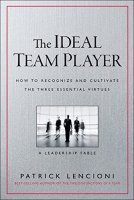
The Ideal Team Player by Patrick Lencioni

Read the summary below and get the key insights in just 10 minutes!


- How to hire someone who has the “three virtues” of an “ideal team player;”
- Why these characteristics – being “humble, hungry” and “people smart” – are crucial to your team; and
- How to exemplify these ideal traits as a manager.

The “Three Virtues” of “Ideal Team Players“
To hire great team players, evaluate prospective hires in light of the requirements of effective teamwork, which demands a foundation of “vulnerability-based trust, healthy conflict, active commitment, peer-to-peer accountability and a focus on results.” Then, hire people who have the three traits that all good team players share: “humility, hunger” and “people smarts.”
An employee or prospective hire who lacks these qualities isn’t a promising candidate to be a good team member. All three virtues are vital to teamwork, as this business fable demonstrates:
Hiring Ideal Team Players
Jeff Shanley had devoted 20 years of his life to working in Silicon Valley. He had been wanting to make a career change, when his uncle Bob Shanley told him about a change he had to make. Due to a recently diagnosed heart problem requiring surgery, Bob had to retire as CEO of Valley Builders (VB), the Napa Valley contracting firm he’d founded. Jeff asked Bob to appoint him to the position and Bob agreed to make Jeff VB’s new CEO.
Jeff took over the management of a firm with a workforce of more than 200 people. The company had just won two giant contracts: a new hotel in Selena and the Queen of the Valley Hospital project, but it had never worked on two projects that big at the same time.
Each job was as big as anything the firm had ever handled. The company would have to increase its staff to tackle both mega-projects. Due to complex financial and contractual arrangements, Jeff couldn’t drop either one.
Two experienced VB senior executives were on hand to help Jeff run the firm. Clare Massick was in charge of finance, legal and HR. Bobby Brady ran all VB field operations. Bobby told Jeff that VB needed to hire 60 more employees within the next eight weeks. The company, which had a high turnover rate, would have to hire 80 workers to fill that need since approximately 20 of them would quit. Jeff was flabbergasted. “That’s 33% turnover!” he told Bobby.
Clare explained that Jeff’s uncle Bob had been particular that new hires should “fit the VB culture.” She said that Bob wanted his employees to be good team players.
Meanwhile, Clare reported that VB was experiencing big problems with its ongoing project in Oak Ridge: Two foremen had quit over toxic job conditions, a project manager was doing a poor job and “pushy foremen” were creating employee dissatisfaction. Jeff asked if VB had fired anyone for creating these problems and learned it had not.
Jeff told Clare that she and Bob had failed to manage teamwork. Now, faced with the extensive hiring Valley Builders needed to undertake, Jeff focused on developing a reliable personnel formula for hiring strong team players. He believed that any current VB employees who weren’t good team players needed to come up to speed quickly or find work somewhere else.
Valley Builders needed reliable indicators to identify ideal job applicants. Jeff didn’t want to hire any “jackasses.” He launched extensive internal research to determine what traits distinguished VB’s ideal team players. Working hard, Jeff came up with useful findings. He met with Clare and Bobby to explain what he had learned.
He told them Valley Builders needed to focus on job candidates who have three personality aspects – humility, hunger and people smarts. In practical terms, these traits mean “having no ego, working really hard and knowing how to deal with people.”
Ideal team players are humble, not egotistical. They are hungry, which makes them “passionate about the work they’re doing.” And, they’re smart with people. These characteristics became the bedrock of VB’s “new hiring model.” Morale skyrocketed. Turnover plummeted. The two new mega-projects went well. And, VB soon became “a jackass-free zone.”
The “Ideal Team-Player Model”
To fill your workforce with ideal team players, seek employees with all of the three core team-player virtues. Employees who lack them all will be terrible team members. Those who have only one of the three values will have an extremely hard time performing as useful team members. Although people with two of these three characteristics can become valued team members, that will take a lot of hard work. Here’s why:
- Hungry and smart, but not humble – This person is a “skillful politician” who will be unwilling to support team decisions that don’t further his or her own personal interests.
- Humble and smart, but not hungry – This person will be a “lovable slacker” who won’t work hard to help the team achieve its goals.
- Humble and hungry, but not smart – This employee will be an “accidental mess-maker” who will inadvertently create vexing problems for the team.
Humble
Humility is, by far, the most important of the three virtues. Humble people don’t have ego problems. You should never hire or tolerate employees with monster egos. This hiring mistake can happen when a company hires staffers only because they have great work skills. Arrogant employees are team killers. Not all employees with humility problems are pompous or stuck up. Some are the reverse: They totally lack self-confidence. Executives may assume they’re humble, but people who are unsure about what they’re doing can become a drag on their team.
Hungry
Hungry people are never satisfied with what they have. They always want more. To get what they want, they’re proactive go-getters who work extremely hard. They are proud of their work ethic. To hungry people, being called a slacker is the worst insult in the world. During interviews, many job applicants who are not actually hungry will often pose as if they are. Determining the real psychology of a person who puts up a false front during an interview is difficult.
People Smarts
Employees with people smarts are not necessarily brilliant thinkers, but they get along well with others. They can read people, they exhibit strong common sense, and they have an almost intuitive understanding about where other people are coming from and what matters to them. They think before they speak or act in any way that affects others. These team members can be positive influences or they can use their gifts to manipulate other people for their own ends.
Team members who are hungry, humble and people smart will be able to develop trust. They will welcome productive dissent. They will accept and support group decisions, even if they initially disagree. And, they will insist that their teammates become accountable for their individual actions. Ideal players support the team’s plans and goals, even if they have different objectives.
Interviewing New Hires
You want to hire only ideal team players. Look for specific “behaviors and attributes” that demonstrate your interviewee is humble, hungry and smart.
Avoid “silo hiring” – that is, don’t have different people from your firm interview the same person separately without conferring immediately after meeting the applicant. Different interviewers should talk to each other promptly about what they discern regarding the three crucial personality traits. Use group interviews to get your colleagues’ immediate reactions.
Conduct nontraditional interviews. For example, ask the applicant to accompany you on a shopping trip so you see how he or she interacts with other people. Just riding in your car with an applicant can prove quite revealing about what counts most to him or her. Ask applicants how their current or previous colleagues might describe them. Also ask, “How would your manager describe your relationships with your colleagues?”
Pay attention to your hunches about the applicant. Tell the applicant your organization hires only humble, hungry, smart people, and that those who don’t fit this description will be uncomfortable working there. To detect humble, hungry and smart personality characteristics, ask:
- Humble – “Tell me about the most important accomplishments of your career.” Be on the lookout for how many times the applicant uses the words “I” or “we.” Using “we” more often indicates humility.
- Hungry – “What is the hardest you’ve ever worked on something in your life?” Determine if the applicant enjoyed or merely tolerated this experience.
- Smart – “How would you describe your personality?” Most applicants who are smart about people are introspective and know their strengths and weaknesses. Those who aren’t smart about people may have a hard time answering this question.
Probably the most important question about a job applicant is one you should ask yourself: “Would I want to work with this person every day?” Your answer will tell you how you – and your colleagues – feel about hiring this person.
Always make sure that an applicant’s reference contact feels comfortable talking to you. Don’t lead a previous boss to think that he or she is governing the applicant’s fate. Ask the reference to describe the applicant in three or four adjectives. Ask how the applicant’s colleagues would describe him or her.
Evaluating Current Employees
Ask current employees to evaluate themselves. Determine if they admit errors (humble), work extra hours (hungry) and are concerned about their colleagues (people smart). To find out if a current employee possesses the three critical virtues, ask yourself:
- Humble – Does this person “genuinely compliment or praise teammates without hesitation?”
- Hungry – Does the staffer do more work than the job requires?
- Smart – Does this employee “demonstrate an interest in the lives of teammates?”
You can help employees develop these virtues by offering feedback if they don’t show proper deference to a colleague, don’t work hard enough or demonstrate weak people skills.
Self-Development
To become more humble, hungry and smart as a manager:
- Humble – To develop humility, consciously act humble. Be polite. Compliment your colleagues. Ask them how they feel.
- Hungry – For those who lack this drive, it’s the most difficult virtue to develop. To become hungry, do more work.
- Smart – If you lack people smarts, accept guidance in this area. For example, someone might prompt you, “This is the part of the meeting where you should thank her for what she did.”
Managers are responsible for correcting or improving employee behavior. If you keep reminding staffers to do things differently, they will either work hard to improve, or they’ll get tired of your constant remonstrations and leave. Both these outcomes are positive for your organization. When problem employees either get better or depart, they stop being problems for you.[/text_block]






